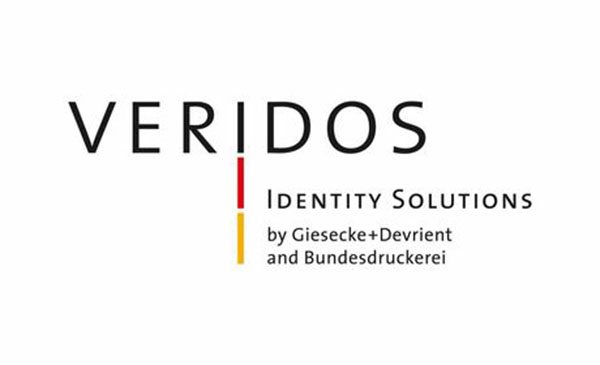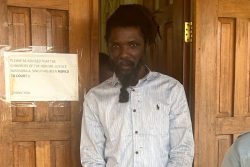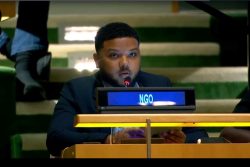Insisting that the contract was legal but not addressing key issues and concerns surrounding the US$34 million e-governance deal, government yesterday launched an attack on civil society group, the Guyana Human Rights Association (GHRA).
It also scoffed at the suggestion by GHRA to pause the contract and allow for it to be taken to Parliament.
“The unfortunate but stark reality is that the GHRA is a sham organization, comprising a one man show, conducted by an individual who is highly partisan and who is incapable and unprepared to display any modicum of independence or objectivity in the public postures he takes,” a Ministry of Finance release yesterday stated.
“The Government of Guyana maintains that the contract with Veridos was lawfully executed, with an internationally reputable group, and is intended to deliver a product that will transform citizen experience in Guyana with the introduction of the integrated electronic national identification card. Once introduced, the card will enable citizens to interact with all government agencies and many private sector entities using this single unique and secure identifier, and will vastly improve the efficiency of service delivery to citizens,” it added.
The release did not explain the procurement process utilised.
On March 10, the government hurriedly announced the virtual signing of the deal with the Germany- headquartered Veridos with the United Arab Emirates (UAE) acting as an intermediary. To date the Emirates’ financial role in the deal has not been defined.
Critics have pointed out that the deal is a flagrant violation of the country’s procurement laws and has been concluded without the requisite privacy and data security laws in place. A key feature of the deal would be an electronic ID card that consolidates the data of the holder, providing for easier access to public and private sector services.
On Monday, the GHRA called on the government to pause the project and submit it to Parliament.
In a statement, the GHRA remarked that the signing of a pact for e-governance “without the framework legislation covering Data Protection being in place, is reckless in the extreme. Given the haste, absence of public consultation and threats to the integrity of personal information, not to mention the seeming illegality of sole-sourcing the project, the Guyana Human Rights Association… is calling for the project to be paused and submitted to Parliament.”
The GHRA noted that Guyana is unique in the Caribbean at present in having no Electronic Transactions Act to take the place of the time-consuming and stressful paper-based procedures, such as registering births and deaths, opening a bank account, or registering a company.
For a number of years, the GHRA explained, CARICOM countries have been holding serious consultations on Data and Privacy Protection legislation on vital matters such as terms of consent, data-sharing by government agencies, and the ‘right to be forgotten’. The human rights body opined that all of this is sidelined by a government dazzled by the prospect of “e-health, e-education, e-security, e-agriculture, electronic permits, and licence processing, etcetera.”
According to the Tech Transactions & Data Privacy 2022 report, published in the recent edition of The National Law Review, the GHRA said that “businesses are increasingly pivoting to digital service models that leverage the internet in place of in-person transactions.”
GHRA also highlighted that the key democratic and ethical issues associated with the adoption of such legislation is the misuse of data transferred internationally by countries and multinational companies. It informed that the European Union, for example, recognises only 13 countries to which data may be transferred safely, the United States not being one of them. Apart, therefore, from the practical challenges entailed by digitalisation, the Association underlined that there are also human-rights concerns in relation to the protection of personal and nationally sensitive data.
“Contrary to the caution required in this area, Guyana’s transition from a state of electronic illiteracy to a digital world is being placed (and if sole-sourced – illegally) in the hands of foreign private companies, apparently orchestrated by the United Arab Emirates, tarnished by its illegal gold transactions”, the GHRA said.
It added: “The most prudent course of action would be for Guyana to engage with CARICOM in an effort to ensure that this new project harmonizes with and benefits from the Parliamentary experience of CARICOM States such as Barbados, Trinidad, and Jamaica. Indeed, as a gesture of regionalizing Guyana’s new-found wealth, Guyana’s Parliament should offer to fund a digitization process in CARICOM”.
Full conformity
The government yesterday said that the GHRA’s assertions are false and that the contract was in full conformity with the Procurement Act.
“Contrary to the false assertion made by the GHRA, the contract in question was awarded in full conformity with the Laws of Guyana including the procurement laws. Additionally, the company who will be developing the solution for Guyana is a highly regarded supplier of items of this nature internationally, and its shareholding comprises two major entities operating in the secure printing industry worldwide, Giesecke & Devrient and Bundesdruckerei GmbH, both of whom have unchallengeable longstanding reputations globally,” the release said.
However, the statement was void of information concerning the UAE’s Sheikh Ahmed bin Saeed al Maktoum’s financial role and the shareholding percentage of the UAE in the German-headquartered Veridos.
Government is insisting that it sought the approval of the National Procurement and Tender Administration Board (NPTAB) regarding its sole-sourcing of the US$34 million contract, while asserting that it was a project that fell under national security, sources say.
However, former Auditor General, Anand Goolsarran weighed in, pointing out that while sole-sourcing is catered for under national emergencies and national security, the awarding of the contract facilitated by UAE’s Sheikh Ahmed bin Saeed al Maktoum was for electronic cards and therefore does not qualify. He still believes that the contract violates the Procurement Act.
He further stated that while the sole-sourcing section of the Act was used, the justification is flawed because the project cannot be classified as being one of national security.
“Section 3(2) of the Procurement Act states that the Act does not apply to procurement involving national defence or national security. Additionally, by Section 28 (e), where the procuring entity determines that Section 3(2) is applicable as a result of national security concerns, then it may consider the single-source method as the most appropriate method of procurement. Single-source procurement occurs mainly in relation to the following: a) where the goods or construction are available only from a particular supplier or contractor, or a particular supplier or contractor has exclusive rights with respect to the goods or construction, and no reasonable alternative or substitute exists; b) the services, by reason of their highly complex or specialized nature, are available from only one source; and c) owing to a catastrophic event, there is an urgent need for the goods, services or construction, making it impractical to use other methods of procurement because of the time involved in using those methods.”
“The Act does not define `national security’ and therefore we have to apply the ordinary meaning of the words. National security is defined as `the safety of a nation against threats such as terrorism, war, or espionage.’ It is concerned about foreign relations and protection from internal subversion, foreign aggression to terrorism. It can hardly be argued that the production of electronic ID cards is a matter of national security,” he added.









